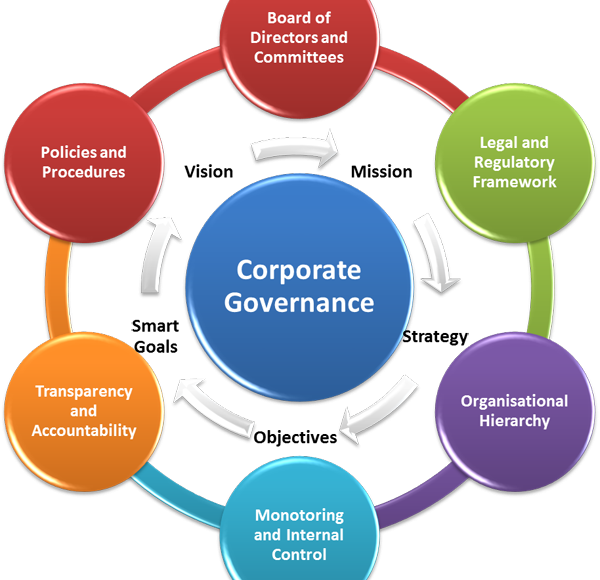Corporate governance is defined as a system by which companies are directed and controlled.
Corporate governance refers to a framework of procedures, policies, and rules that is used to determine the overall performance, direction and compliance of the company.

Rules of corporate governance for effective corporate governance are:
- Commitment begins at the top.
- Accountability must be established and communicated clearly.
- Alignment between the structure and the business is imperative.
- Flexibility to adapt and build up on the sustainability programme across business units and regions can advance the sustainability agenda.
Globally, health systems' governance has received increased attention as it influences the core goals of good health outcomes, responsiveness to community expectations, and fair financial contribution. The World Health Organisation (WHO) proposed six building blocks of a health system that are essential to achieve these goals, with leadership and governance as the most important building block. The 2015 sustainable development goals have underscored the importance of governance in achieving health and development objectives. Numerous definitions of health systems' governance have been proposed. King has proposed that effectiveness and ethical leadership constitute the most important characteristics of organisational governance. This paper uses the WHO definition which states that health systems' governance is a national function that require the existence of strategic frameworks ‘combined with effective oversight, coalition-building, the provision of appropriate regulations and incentives, and accountability’.
The International Labour Organisation (ILO) Convention defines OHS as ‘services’ entrusted with essentially preventive functions and responsible for advising the employer, the workers and their representatives on matters relevant to establishing a healthy and safe working environment. OHS are regarded as specialised healthcare services, of which one of the goals is to monitor and protect workers’ health in their place of employment. OHS governance is critical as ineffective governance contributes to financial losses through work-related ill-health, injuries and sickness absenteeism, and the large burden of occupational disease and injury. Evidence also shows that poorly-regulated health services lead to distortions in the type, quantity, distribution, quality and price of services, a concern that has been raised in the occupational health (OH) sector.
South Africa is a member state of the ILO (International Labour Organisation) authorised International Convention known as the Occupational Safety and Health Convention. In consort with the WHO building blocks for a health system, this Convention requires that member states develop a national policy for health and safety with objectives;
- Indicate the roles.
- Functions and responsibilities of stakeholders.
- Apply a system of inspection with adequate penalties to enforce the laws and regulations.
- Provide guidance to employers and stakeholders on compliance with legal obligations and, through consultation, ensure necessary coordination between stakeholders to give effect to Convention.
The Convention also recommends the establishment of a central oversight body.
The objectives of the Convention were endorsed at the 13th Joint ILO/WHO Committee on Occupational Health, which recommended that basic occupational health services (BOHS) should be available to all workers. The objective of BOHS is the provision of OHS to all workplaces that either does not have such services or have services that do not meet the current OH needs. It is estimated that 10% to 15% of the global working population have access to some form of OHS and that coverage is required in all sectors of the economy, including formal, informal and self-employed, regardless of occupation, size of the workforce, geographical location or mode of employment. The BOHS model proposes four levels of service delivery, ranging from services to employees where there are no on-site OH services to comprehensive OHS delivered through multi-disciplinary teams, creating a diverse system of service delivery.
The legislative framework within which OH is practised in South Africa is complex, with several government departments having a legislative responsibility. Two government departments administer OH activities in the workplace, i.e. the Department of Mineral Resources (DMR) through the Mine Health and Safety Act (MHSA) which administers OH in mines and quarries, and the Department of Labour (DoL) through the Occupational Health and Safety Act (OHSA) which administers OH in all other sectors.
Review of Legislation and Policy Documents
From July 2013 to July 2014, a review was conducted of the South African legislation and policy documents governing OH, OHS and occupational healthcare establishments. Reviewed data sources included the websites of the ILO, WHO, South African National Government, Department of Health, Department of Labour, Department of Mineral Resources, and Sabinet (South African Bibliographic and Information Network). Keywords in the document review included: occupational health, occupational healthcare services, occupational health legislation, and governance of occupational health. The specific laws reviewed were the South African Constitution, OHSA, MHSA, NHA, Civil Aviation Act, Merchant Shipping Act, Health Professions Act, and the Nursing Act.
A strong legislated framework is in place for healthcare in South Africa but with limited control over the behaviour of service providers in the private sector where governance is perceived as voluntary. Evidence suggests that self-regulation is successful under conditions of effective governance.